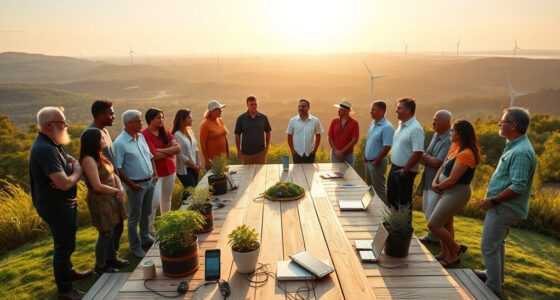To build social capital in distributed teams, focus on establishing clear communication channels with tools like video calls, instant messaging, and virtual spaces for informal chats. Foster trust and psychological safety by practicing open and transparent communication, recognizing contributions, and encouraging informal interactions like virtual coffee breaks or team dinners. Promote collaboration through cross-functional projects and celebrate achievements to boost morale. Continuing along this path will reveal more effective strategies to strengthen your remote team connections.
Key Takeaways
- Foster consistent, transparent communication and cultural awareness to build trust and understanding among team members.
- Use video calls, informal virtual spaces, and social activities to encourage relationship-building and social interactions.
- Recognize team contributions and milestones publicly to reinforce shared success and boost morale.
- Implement peer coaching, mentorship, and feedback systems to strengthen connections and psychological safety.
- Utilize social network analysis and mapping to monitor relationships, identify gaps, and proactively improve social cohesion.
Understanding the Importance of Social Capital in Remote Settings

While remote work offers flexibility and access to a broader talent pool, it also challenges the development of trust and collaboration. Building social capital becomes essential to overcome these hurdles. You need to focus on trust development, which requires consistent communication and transparency to foster reliability among team members. Cultural awareness plays a crucial role in this process, helping you understand diverse perspectives and avoid misunderstandings. When you acknowledge different cultural backgrounds, you create an inclusive environment that encourages open dialogue. This mutual understanding strengthens relationships, making collaboration smoother despite physical distance. Incorporating auditory processing techniques can further enhance communication clarity within your team. By intentionally nurturing trust and cultural awareness, you set the foundation for a resilient, engaged remote team that values social connections and shared goals.
Leveraging Digital Communication Tools Effectively

To build strong social capital in distributed teams, you must leverage digital communication tools effectively. Use video calls for virtual coffee chats, creating informal moments that foster connection. Incorporate emoji communication to add tone and friendliness to messages, reducing misunderstandings. Schedule regular check-ins to maintain engagement and transparency. Encourage team members to share non-work updates, building trust and camaraderie. Leverage collaboration platforms that support instant messaging and file sharing, streamlining communication. Additionally, utilizing online resources for guidance can help teams implement best practices for remote engagement. By intentionally using these tools, you create opportunities for spontaneous interactions and relationship building, which are essential in remote settings. Remember, the goal is to simulate the social cues and informal exchanges of in-person interactions to strengthen your team’s social fabric.
Establishing Clear and Consistent Communication Channels

Establishing clear and consistent communication channels is essential for ensuring your team stays aligned and informed. You should set up regular scheduled check-ins to create a predictable rhythm and keep everyone on the same page. These meetings help clarify goals, address concerns, and foster accountability. Incorporate a virtual watercooler—a dedicated space for informal chats—to strengthen personal connections and build social capital. Make sure all team members know which platforms to use for different types of communication, whether it’s instant messaging, email, or video calls. Consistency in communication methods reduces misunderstandings and encourages openness. Additionally, understanding the importance of projector technology can help teams better coordinate visual presentations and shared resources. By maintaining clear channels, you create a transparent environment where trust and collaboration can flourish, even across distances.
Creating Opportunities for Informal Interactions

Creating opportunities for informal interactions is essential for fostering strong social bonds within your distributed team. These moments help build trust, boost morale, and create a sense of camaraderie. You can encourage virtual water cooler chats where team members casually discuss non-work topics, mimicking in-office spontaneity. Scheduling informal team dinners via video calls allows colleagues to connect over shared interests, fostering personal relationships. To enhance these interactions, consider hosting themed chat sessions or virtual coffee breaks. Additionally, creating dedicated channels for casual conversations provides a space for spontaneous exchanges. Incorporating social capital building activities into your team routine can further strengthen relationships and improve collaboration. These small but meaningful initiatives help team members feel more connected, ultimately strengthening your team’s social fabric and collaborative spirit.
Cultivating Trust and Psychological Safety

You can build trust and psychological safety by practicing open communication strategies that encourage honest sharing. Recognizing your team members’ contributions reinforces their value and fosters a supportive environment. When you prioritize transparency and acknowledgment, you strengthen the bonds that hold your team together. Additionally, understanding the importance of affiliate disclosure and privacy policies can help maintain trust and credibility within your team and with external stakeholders.
Open Communication Strategies
Open communication is essential for building trust and psychological safety within distributed teams. It encourages openness, reduces misunderstandings, and fosters strong relationships. By promoting honest dialogue, you create an environment where team members feel comfortable sharing ideas and concerns. Incorporate virtual watercoolers to facilitate informal conversations that strengthen bonds. Use peer feedback regularly to promote growth and transparency. Establish clear channels for open dialogue, and model vulnerability as a leader. Encourage active listening and responsiveness to build confidence in communication. Additionally, set expectations for respectful interactions to maintain a safe space for everyone. These strategies help cultivate an atmosphere where trust flourishes, and team members feel valued and heard, ultimately boosting team cohesion and productivity. Developing effective testing practices within your team can further enhance collaboration and quality outcomes.
Recognizing Team Contributions
Recognizing team contributions plays a crucial role in building trust and psychological safety within distributed teams. When you openly acknowledge peers through peer acknowledgment, you foster a culture of appreciation that encourages openness and collaboration. Incorporating regular feedback practices ensures team members feel valued and understood, which strengthens relationships. Be specific in your praise, highlighting individual efforts and how they impact the team’s success. Consistent recognition not only boosts morale but also encourages continued engagement. Remember, genuine acknowledgment creates a safe environment where team members are more willing to share ideas and admit mistakes without fear of judgment. By prioritizing recognition and feedback, you cultivate an atmosphere of mutual respect that enhances social capital across your distributed team. Additionally, understanding the importance of emotional support systems can further strengthen team resilience and cohesion.
Promoting Collaborative Projects and Cross-Functional Teams

Promoting collaborative projects and cross-functional teams is essential for building social capital in distributed environments, as it encourages diverse perspectives and shared accountability. When you foster cross department collaboration, you break down silos and create opportunities for team members to learn from each other. Incorporate virtual team bonding activities to strengthen relationships and trust across distances. These initiatives boost engagement and improve communication, making collaboration more effective. Additionally, establishing clear goals and roles helps keep everyone aligned and committed. To deepen connections, encourage informal interactions alongside formal projects. This approach nurtures a sense of community, even remotely, and enhances social cohesion. One way to support this is by utilizing gelato flavors to foster informal conversations and build rapport among team members.
Recognizing and Celebrating Team Achievements

Celebrating your team’s successes boosts morale and builds trust. You can do this by highlighting milestone moments that matter most. Organizing recognition events makes achievements feel special and encourages continued effort. Incorporating appreciation for team members’ performance can further strengthen your team’s cohesion and motivation.
Highlight Milestone Moments
Have you ever experienced how a simple acknowledgment can boost team morale? Highlighting milestone moments is a powerful way to do this. Celebrating achievements, big or small, reinforces a sense of progress and shared success. Milestone celebrations create opportunities for team bonding, strengthening connections across remote members. Recognize key project completions, anniversaries, or personal growth moments to keep motivation high. To maximize impact:
- Publicly acknowledge accomplishments during team meetings
- Share success stories through internal communication channels
- Incorporate visual progress trackers
- Personalize recognitions to make team members feel valued
- Incorporate herbal teas during team celebrations to foster a relaxing and enjoyable atmosphere
Organize Recognition Events
Building on the momentum from highlighting milestone moments, organizing recognition events offers a dynamic way to honor team achievements. These events boost morale and foster peer appreciation, especially in virtual settings. Incorporate virtual icebreakers to create an engaging atmosphere and encourage team members to connect meaningfully. Recognizing accomplishments publicly reinforces positive behaviors and strengthens social bonds. Consider pairing formal awards with casual celebrations to balance professionalism and fun.
| Purpose | Benefit |
|---|---|
| Peer Appreciation | Builds trust and camaraderie |
| Virtual Icebreakers | Breaks down barriers, energizes the team |
| Celebrating Achievements | Motivates continued high performance |
| Recognition Events | Enhances overall team cohesion |
Providing Support and Resources for Relationship Building

Providing adequate support and resources is essential for fostering strong relationships within distributed teams. When you invest in tools and programs like virtual mentorship and peer coaching, you create opportunities for meaningful connections. These initiatives help team members share knowledge, build trust, and develop camaraderie despite physical distances. To deepen these efforts, consider offering platforms for informal interactions, training on communication skills, and guidelines for collaborative projects. Encouraging participation in peer coaching sessions promotes mutual growth, while virtual mentorship connects experienced members with newcomers. Additionally, providing resources like discussion forums or social apps can facilitate ongoing relationship-building. By prioritizing these supports, you strengthen your team’s social fabric, making collaboration more effective and creating a sense of community that transcends geographic barriers.
Measuring and Enhancing Social Capital Over Time

Once you’ve established support systems and resources to foster relationships, the next step is to track how these efforts impact your team’s social fabric over time. You can use network analysis to measure connections, collaboration patterns, and information flow within your team. Social network mapping visually represents these relationships, highlighting key connectors and isolated members. Regularly updating these maps helps you identify gaps and strengths in your social capital. By monitoring changes, you can assess whether your initiatives are effective or need adjustment. Over time, this data-driven approach allows you to proactively strengthen relationships, encourage trust, and enhance overall team cohesion. Consistent measurement and analysis ensure your distributed team maintains vibrant social capital that supports productivity and innovation.
Frequently Asked Questions
How Can Leadership Foster Social Capital in a Virtual Environment?
To foster social capital in a virtual environment, you need to focus on trust building and informal communication. Encourage open conversations, create opportunities for team members to share personal stories, and recognize achievements regularly. By promoting transparency and casual interactions, you help strengthen relationships. As a leader, your active engagement and support make team members feel valued, ultimately building a stronger, more connected, and collaborative virtual team.
What Are Common Barriers to Building Social Capital Remotely?
Oh, the irony is thick—building social capital remotely sounds easy, right? But common barriers like lack of virtual trust and limited informal interactions make it tough. You might find it hard to connect genuinely when screens replace face-to-face chats. Without spontaneous conversations, trust can falter, and relationships suffer. Overcoming these hurdles requires intentional effort to foster virtual trust and create spaces for informal interactions, ensuring bonds don’t fade in the digital world.
How Does Cultural Diversity Impact Social Capital Development?
Cultural diversity impacts social capital development by influencing communication styles and requiring greater cultural awareness. You need to recognize different ways people express themselves and adapt your approach accordingly. When you demonstrate cultural awareness, you foster trust and understanding, making collaboration smoother. By valuing diverse perspectives and adjusting your communication, you strengthen relationships and build social capital more effectively within diverse teams.
What Role Does Onboarding Play in Social Capital Formation?
Imagine a bridge connecting hearts—onboarding plays that essential role in social capital formation. You foster trust building through meaningful onboarding, encouraging informal interactions that deepen relationships. When you create a welcoming, transparent process, you lay the foundation for collaboration and camaraderie. By prioritizing genuine connections early on, you guarantee your team feels valued and united, transforming individual efforts into a resilient, cohesive community.
How Can Teams Sustain Social Capital During Organizational Changes?
During organizational changes, you can preserve social capital by prioritizing trust building and encouraging informal communication. Foster open dialogue, acknowledge concerns, and maintain consistency in your interactions. Support team members through transparency and empathetic listening, helping relationships stay strong. By actively nurturing trust and creating spaces for informal conversations, you guarantee connections remain resilient, even amid change, keeping your team cohesive and engaged.
Conclusion
Building social capital in distributed teams isn’t just about tools or protocols—it’s about forging genuine connections that reveal hidden potential. As you implement strategies, the real challenge lies ahead: how will these bonds withstand future uncertainties? Keep nurturing trust, encouraging collaboration, and celebrating milestones. The true test will come when your team faces the unknown. Will your social fabric hold firm, or will it unravel under pressure? The choice—and the future—are in your hands.









